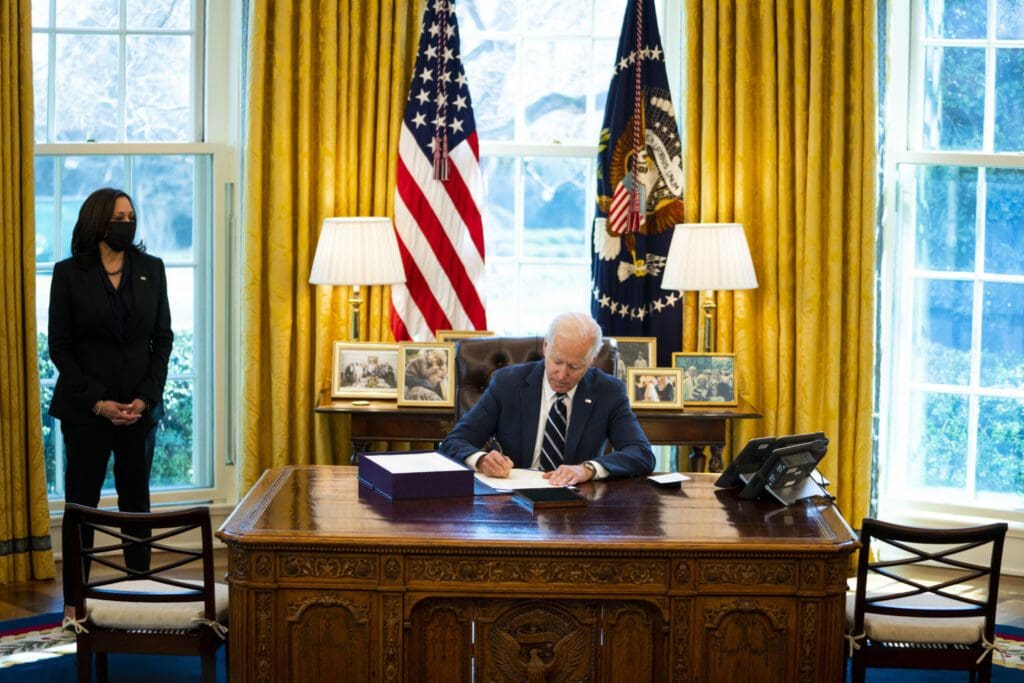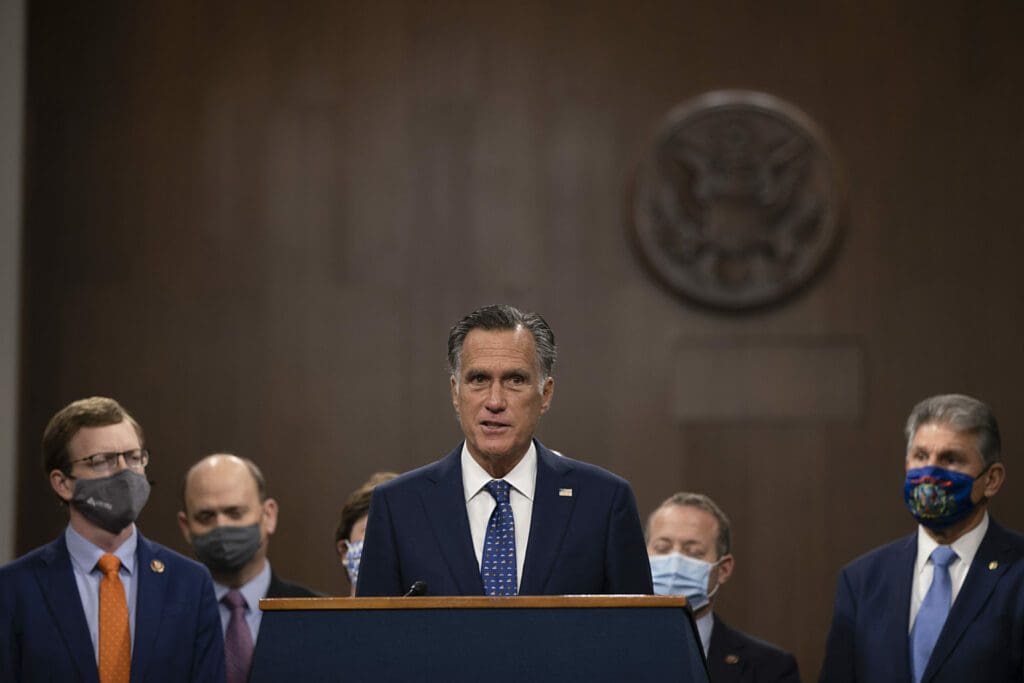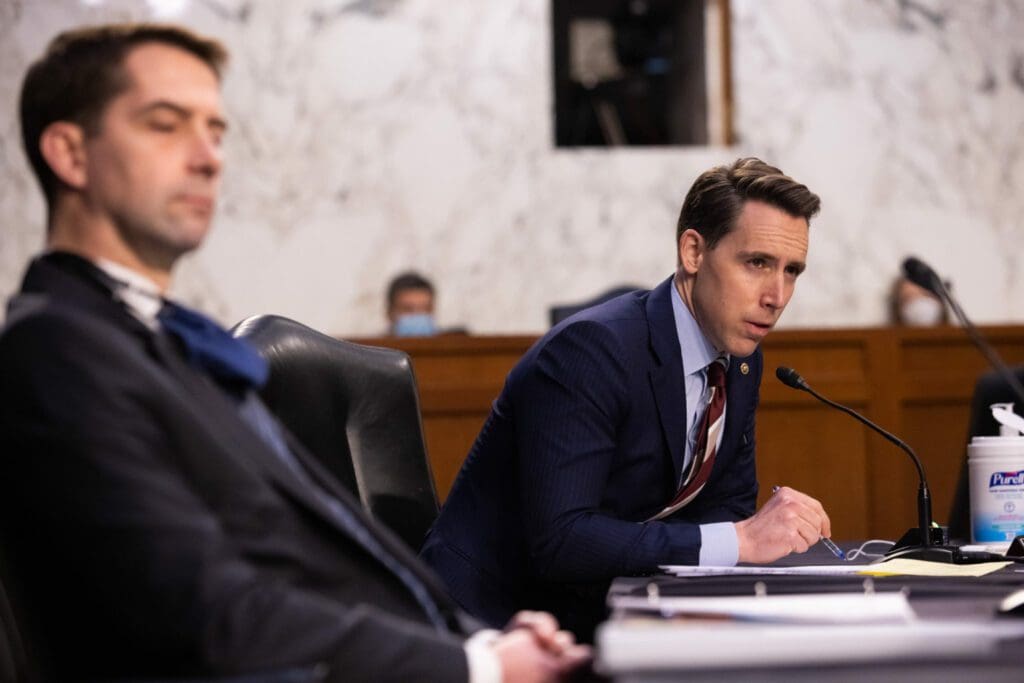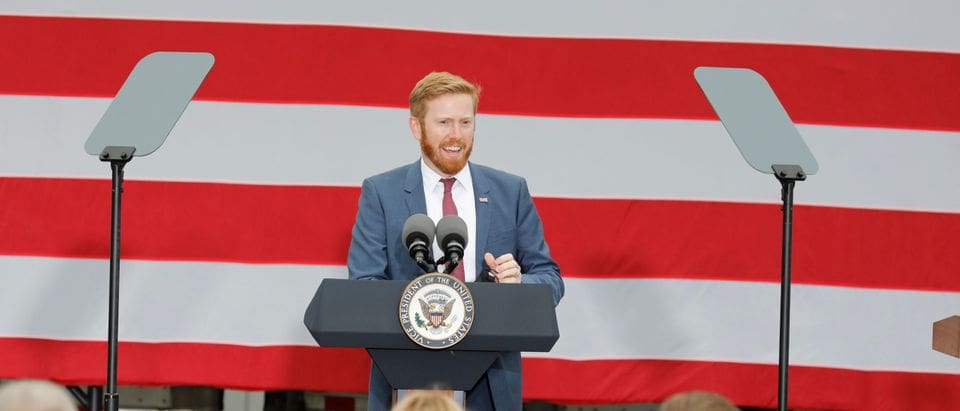By Andrew Trunsky
- After years of fiscal conservatism and deficit hawkishness, the Republican Party has shown signs of a shift toward a more populist, pro-worker economic platform.
- Some Republicans have introduced proposals aimed at increasing the minimum wage or providing cash relief that hardly resemble previous efforts to cut spending or taxes, but instead mirror increasing calls to help working-class Americans who were struggling even before the coronavirus pandemic.
- “There has been a strongly populist bend,” Republican Rep. Peter Meijer told the Daily Caller News Foundation. “I think we’ve seen a lot of folks who are guessing that’s the way the party is going, and are proposing options that are more based around generating broad political support than they are around pursuing a more narrow policy end.”
- “There’s a recognition [among Republicans] that the government already constantly intervenes in the market,” said Rachel Bovard, the senior director of policy at the Conservative Partnership Institute. “There is a growing number of people on the right who are saying, ‘we already do this … Why aren’t we doing it to support the people who make up this country?’”
After years of rhetoric echoing fiscal conservatism and deficit hawkishness, the Republican Party has shown signs of embracing a more populist, pro-worker economic platform as more Americans look to the government for financial help.
Some Republican lawmakers have introduced proposals since the pandemic began aimed at increasing the minimum wage or providing cash relief that hardly resemble previous efforts to cut spending or taxes, but instead mirror increasing calls to help working-class Americans who were struggling even before the coronavirus pandemic. And while some in the party debate what forces have driven the change within the party, there is little doubt among Republicans that change is occurring.
“There has been a strongly populist bend,” Republican Rep. Peter Meijer, a freshman from western Michigan and a member of the bipartisan Problem Solvers Caucus, told the Daily Caller News Foundation.
“I think we’ve seen a lot of folks who are guessing that’s the way the party is going, and are proposing options that are more based around generating broad political support than they are around pursuing a more narrow policy end.”
Meijer is one such Republican. He has advocated for direct cash relief instead of existing welfare programs that have large bureaucratic components and generate “paperwork overhead” for those depending on it, arguing that it can deliver critical aid to struggling Americans in more effective means that adheres to the idea of limited government.
He even introduced his Direct Dollars Over Government Expenses ($DOGE) plan, which would have given $2,400 checks to qualifying Americans instead of the $1,400 outlined in the American Rescue Plan. His bill, however, was nearly $1 trillion smaller than the ARP, which President Joe Biden signed into law on Mar. 11.

‘For Whose Benefit?’
Republicans also overwhelmingly supported earlier bipartisan relief plans that included direct checks, including the CARES Act passed last March and the stimulus passed in December, despite their extraordinary size and scope.
“There’s a recognition [among Republicans] that the government already constantly intervenes in the market,” Rachel Bovard, the senior director of policy at the Conservative Partnership Institute, told the DCNF.
“The debate right now is for whose benefit should that be done? … There is a growing number of people on the right who are saying, ‘we already do this, why aren’t we doing it for the family? Why aren’t we doing it to support the people who make up this country?’”
Even though every congressional Republican voted against the American Rescue Plan largely due to its lack of targeted relief, Meijer said that there is bipartisan opportunity regarding cash payments and other pro-worker policies.
“There are Republicans who are willing to enter into good-faith negotiations,” Meijer said, discussing how there were broad areas of agreement over coronavirus vaccine and testing aid and direct payments for individuals and small businesses.


When asked if a large aid bill primarily focused on cash relief and pandemic aid would have sailed through Congress with bipartisan support: “I believe it would,” Meijer said. “Those earlier [relief] bills were not viewed with an inherently partisan lens.”
Not only has cash relief become more popular among lawmakers and voters alike, but an increasing number of Republicans believe that its expansion can coexist with the idea of fiscal conservatism.
“Direct cash payments have long been part of the conservative playbook,” Scott Lincicome, a senior fellow at the Cato Institute, told the DCNF.
“There has always been an attraction among free-marketers for the most basic type of assistance, which is a direct cash payment … Basically, you just give people money.”
Far From Unanimous
Many Republicans have pushed back against the intraparty shift and instead advocated fiscal conservatism and deficit hawkishness even with the pandemic. A majority of Senate Republicans blocked a December push for $2,000 stimulus checks multiple times even after former President Donald Trump backed the effort, with Senate Majority Leader Mitch McConnell labeling them as a “universal cash giveaway” and “socialism for rich people.”
Wisconsin Republican Sen. Ron Johnson blocked a bipartisan attempt to include $1,200 checks instead of the $600 ones in the December stimulus.
“What I fear we’re going to do with this bipartisan package … is a shotgun approach,” Johnson said, objecting to the amendment’s size and lack of targeted funds.
Few in Congress have adhered to the fiscal conservative line more than Sen. Rand Paul, a libertarian-leaning Republican from Kentucky. He not only voted against every major coronavirus relief bill, but has also never voted for the annual defense spending bill or federal budget.
“We have no rainy day fund. We have no savings account,” Paul said in December before the stimulus passed. “Congress has spent all of the money. Congress spent all of the money a long time ago. The monster spending bill presented today is not just a ‘deficit’s don’t matter disaster,’ it is everything Republicans say they don’t believe in.”
But despite the populist shift within the GOP and the growing bipartisan consensus that direct checks are efficient, effective and relatively simple, Republicans say that they are concerned about government spending, and have increased their calls to address the growing national debt since Biden won.
“Cash payments are rarely, in the real world, an alternative to welfare,” Lincicome said. “They are a supplement. And I think that’s really where things can go off the rails, at least from a conservative viewpoint.”
“[Conservatives] have always envisioned payments as a replacement to the welfare state, not a supplement to the existing welfare state,” Bovard said, mentioning how Meijer’s bill beefed up cash payments and pandemic aid while almost eliminating other non-targeted relief.
But even with the concerns over the debt and Republican worry that hyperinflation may occur as a result of the American Rescue Plan, Bovard said that conservative lawmakers who were overly focused on deficits and spending are not in tune with the country or their voters.
“An ideological clinging to deficit hawkishness as if that’s the only thing that matters, as if that’s the biggest threat, is completely missing the stakes of how most people see the world right now,” Bovard said.
“It’s still an issue, but it’s not the ultimate one. People aren’t threatened every day by the debt.”
“I think you have a lot of Republican donors that want to put the debt and the deficit in the driver’s seat because it’s the only thing they feel threatened by. But the reality is, the base of the Republican Party feels threatened on a day-to-day basis by tons of other forces,” she added.


Bipartisanship?
Though the two parties have sharply diverged on social and cultural issues and partisan gridlock has become the default, signs of bipartisanship have appeared among Republicans and Democrats who have pushed for more pro-worker policies. Vermont Independent Sen. Bernie Sanders and Missouri Republican Sen. Josh Hawley jointly introduced a proposal for $2,000 relief checks in December after Trump said the $600 checks in December’s stimulus package were too small, and the pair later introduced similar plans to raise the minimum wage after the Senate parliamentarian excluded it from the American Rescue Plan.
And even though most Republicans opposed Democrats’ effort to pass a $15 minimum wage, some, like Utah Sen. Mitt Romney and Arkansas Sen. Tom Cotton, introduced a joint plan that would raise the wage up from the current $7.25.
“There is a bipartisan consensus that austerity politics and faith in pure market absolutism has failed the working and middle class in America,” California Rep. Ro Khanna, a progressive Democrat from Silicon Valley, told the DCNF. “We can come together to have industrial policy that creates good paying jobs in places left behind and that increases wages for those without a college degree.”
“Recognizing the dignity of work and importance of community is not a left or right idea,” he added.
“It is an idea rooted in ensuring that every American has an equal voice in our democracy and participates in the American dream.”
____
View original article here: https://dailycaller.com/2021/03/30/republicans-embracing-economic-populism-cash-relief-minimum-wage/





















